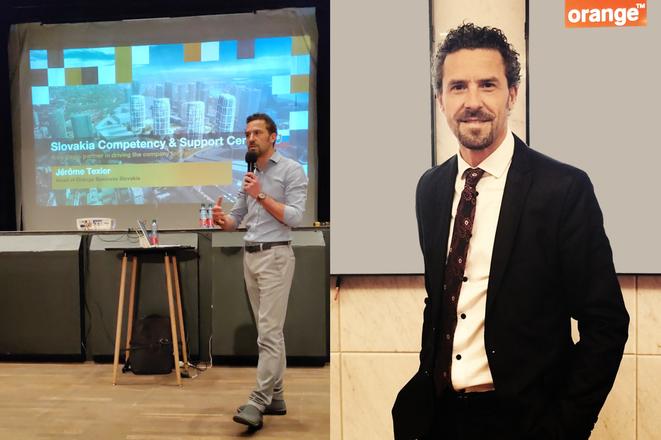Jérôme Texier walks into the reception of a high-rise in central Bratislava, offering a firm handshake and a warm smile. As we step into the lift bound for his office, a colleague seizes the moment to commend him on a recent presentation – one that captivated 200 employees at a company-wide breakfast in January.
“Ďakujem,” he replies in Slovak.
Texier, a Frenchman who has made Slovakia his home, has been at the helm of Orange Business Slovakia’s Competency and Support Center since last summer. One of the centre’s primary responsibilities is to drive Orange’s transformation by being an inspiring hub for bold ideas, future skills, and growth opportunities to better serve customers.
Jérôme Texier
He was born in La Rochelle, France.
He has worked for Orange Business Slovakia since 2012, following previous roles at Johnson Controls Automotive and WhP International in Bratislava.
He is half-Portuguese on his mother’s side – she fled the authoritarian regime of António de Oliveira Salazar.
He has a twin brother, with whom he shares an unusual milestone: they both became fathers on the same day.
He once backpacked for three months across Bolivia, Peru and Chile.
A history enthusiast, he is currently writing a novel.
His motto is: “Everything comes at the right time.”
He speaks Slovak fluently.
He lives in Slovakia with his Slovak wife and two children.
“The core DNA of Orange Business is global networking,” Texier explains. “People do not know that we provide internet, meaning network and connectivity, with the most complex infrastructures, like our vast undersea cables that connect the world. Here in Bratislava, we have a major business unit dedicated to managing network infrastructure and services.”
Beyond infrastructure, the centre also specialises in selling products and services to clients around the world. Orange Business, however, differs from Orange Slovensko, one of Slovakia’s four mobile operators, despite their shared French origins. While Orange caters to the public, offering mobile and internet services, Orange Business focuses on enterprises, providing digital solutions and integrations such as connectivity, cybersecurity and cloud services.
Managing a team of approximately 500 employees comes with challenges, but Texier has been with the company for nearly 13 years. He started as a knowledge management consultant in 2012 and knows the organisation inside out. At the recent breakfast meeting, therefore, he had a clear reason for outlining his vision for the centre and its future direction.
“I felt it was necessary to develop a new site strategy that would increase our visibility within Orange Business,” he says. When asked why, he explains, “Orange Business has its global ‘Lead the Future’ strategy, vision and objectives. But until now, we never had a version specifically tailored to our site in Slovakia. I thought it was important to take the company’s overarching vision, mission and strategy and translate them into a framework that resonates with our work here.”
Orange Business Slovakia, formerly known as Equant Slovakia, has been present in the country since 2012.
iPhone analogy
Texier has a way of making complex business strategy easy to understand. In his recent presentation, he turned to an analogy many in the audience could relate to: the iPhone.
“Why do people buy the latest iPhone instead of a cheaper alternative?” he asked, using the example to illustrate that people choose the iPhone not just for its quality and innovation but also for its reliability, value, and sense of prestige. Texier used this analogy to describe the evolution of Orange Business Slovakia.
“We are not just a cost centre – we are a value centre,” he says. Initially perceived as a low-cost outsourcing hub, the company has, over time, shifted towards a more value-driven model. Texier believes that Orange Business and its clients do not turn to the Slovakia-based centre purely for affordability; they also see quality, expertise and reliability. He emphasises that while cost remains an important factor in hiring, it should not be the sole focus.
“Cost alone doesn’t tell the whole story. Productivity, expertise and cultural fit also play a role.”
Having lived in Slovakia for nearly two decades, Texier has developed a deep appreciation for the local workforce, praising Slovaks’ mindset and calling them schopní (capable and clever). Up to 92 percent of employees at Orange Business Slovakia are locals.
“In France, we tend to wait for the government to provide solutions. If that doesn’t happen, we protest. In Slovakia, people take a different approach – they find a way to make things work themselves,” he says, adding that many of his employees have second jobs, run small businesses, or are active in sports and community organisations. This self-sufficiency, he suggests, is a legacy of the country’s history, despite the hardships of life under the totalitarian regime and later transition to democracy.
“That same mentality translates into the workplace.”
As the leader of a centre with over 500 employees, Texier has also made it a priority to showcase the site’s strengths within the wider Orange Business network.
Showing leaders the way
His recent presentation to senior business leaders focused on positioning Slovakia as a centre not just of cost efficiency but of expertise and high-value operations.
“My goal with this strategy is to provide leadership with the necessary insights to make better decisions,” Texier explains.
In December, two major business units visited Bratislava. Some executives, for example, were unaware that Slovakia hosts over 70 shared service centres and maintains the highest productivity rates in the region.


 Jérôme Texier moved to Slovakia for love and built a career at Orange Business. (source: Courtesy, Jérôme Texier)
Jérôme Texier moved to Slovakia for love and built a career at Orange Business. (source: Courtesy, Jérôme Texier)